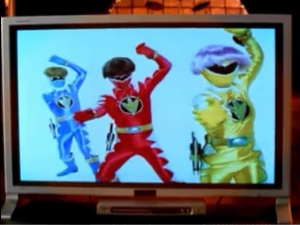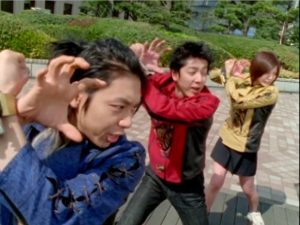Episode 19: “Lost & Found in Translation”
Originally aired: June 13, 2004
I have a lot of love for “Lost & Found in Translation,” an episode I’d easily consider one of my top five favorite episodes of the franchise, ever. With nearly 800 episodes under the show’s belt, and seasons like In Space or RPM that I love more than my cat, that’s saying a lot. So it’s hard to try to have any semblance of objectivity upon revisiting it. It’s just such a clever idea, no matter how it’s executed. And honestly? It’s executed very well.
This was one of the first picks I threw into the pot when writing my 20 Episodes for the 20th Anniversary piece, where I wrote:
“Lost & Found in Translation” is the most meta episode of the show ever made, as the Rangers watch a weird, Japanese-produced adaptation of their adventures–which in actuality is a straight dub of the Super Sentai source Power Rangers borrows its material from. While it appears to be poking fun at the Japanese material at first, the episode instead becomes a statement on both Power Rangers and Super Sentai purists: arguing over which is better is moot, because both are cool in their own ways.
None of those thoughts are unchanged upon rewatching it again, for probably the millionth time, even trying to look at it from some kind of new light. It’s easy to see why some people might not totally enjoy (or, pretentious as it may sound…”get”) the episode; if you’re not into Community-levels of meta, it’s just going to come off as self-indulgent schlock. It’s also easy to be a little irritated as a Sentai fan, given that it uses one of the silliest episodes of Bakuryū Sentai Abaranger, then makes it even sillier by doing a godawful English dub of it. Turn off the episode halfway through, and it really does look like it’s making fun of a Japanese show without any respect of its own roots.
Kira would be at your throat if you did that, though, telling you “It’s one episode, of one TV show, and you haven’t even seen the whole thing!” This is where our own core three play into it, with their comments representing the whole scope of the matter. At first, Conner is expectedly xenophobic in the same way any uncultured American is about foreign entertainment. This episode is so carefully crafted that it actually almost justifies Conner’s complaints, as the Abaranger episode in question, “Abare Leaguer Bind,” happens to be one with a greedy American character. It doesn’t paint America in a great light for the most part — “American sports heroes are so gullible, that’s what you get for having such a big ego,” the Japanese Blue Ranger says, which really pisses Conner off. But that also ends up being the point of the show within the show — Wacker Wilson has to learn to not be so greedy and focus on his love of the game. That directly nixes Conner’s complaints on that front, in a way it might not have had an American character not been present.
Instead, Conner’s comments progress to parallel common internet fandom complaints, not just about Power Rangers, but about adapted material in general. “Lost & Found in Translation” crafts a situation where a beloved serious story is adapted into a ridiculously silly, weird and poorly-edited cartoon of a show. If that sounds familiar, it’s exactly what some people feel Mighty Morphin Power Rangers did to Kyōryū Sentai Zyuranger.
So, here we have the reverse of a real-life situation that’s one of the biggest ongoing debates in the Power Rangers/Super Sentai community: Which one is better? And it’s done by having the Power Rangers watching a Japanese show adapted from them that’s really the Japanese show they were adapted from. That’s insane, and it’s brilliant, especially considering how perfectly the silliness and the inclusion of the American character this particular episode they chose plays into all of this. The fact that this dub is so bad seems intentional — the voices are obnoxious, the translation and lip sync is awkward, and there’s a random Irish voice for literally no reason — and that’s another very common Japanese-to-English adaptation concern. This is an episode that clearly had a lot of thought put into it to set up a rather heady in-joke, and then turn that joke into a discussion about our own tastes and need to quantify everything we like.
 It’s that discussion that makes me fall in love with this episode again and again. Because Kira pretty much provides the best insight on this: “We’re not so different after all, just a slightly different interpretation.” Conner comes around as soon as the typical Ranger action happens, which is the main connective tissue between the Japanese and American iterations. The thing that draws most people to either Power Rangers or Super Sentai is the action, which comes from a bunch of people in colorful spandex flipping around, blasting monsters, and piloting giant robots. As important as plot and characterization are, there’s a superficial element to any type of media that draws people in, and Power Rangers and Super Sentai literally have the exact same superficial draws, no matter how they differentiate. And once Conner is brought in through those superficial elements, it helps him get past anything he deems “weird” and see the heart of the material. It’s not exactly the kind of show he wants, personally, but it still has worth. And as we see in the final shot of the episode, there are still people out there who love it regardless, no matter how he feels.
It’s that discussion that makes me fall in love with this episode again and again. Because Kira pretty much provides the best insight on this: “We’re not so different after all, just a slightly different interpretation.” Conner comes around as soon as the typical Ranger action happens, which is the main connective tissue between the Japanese and American iterations. The thing that draws most people to either Power Rangers or Super Sentai is the action, which comes from a bunch of people in colorful spandex flipping around, blasting monsters, and piloting giant robots. As important as plot and characterization are, there’s a superficial element to any type of media that draws people in, and Power Rangers and Super Sentai literally have the exact same superficial draws, no matter how they differentiate. And once Conner is brought in through those superficial elements, it helps him get past anything he deems “weird” and see the heart of the material. It’s not exactly the kind of show he wants, personally, but it still has worth. And as we see in the final shot of the episode, there are still people out there who love it regardless, no matter how he feels.
“Lost & Found in Translation” honestly seems more relevant in 2015, in the midst of our adaptation/reboot/remake craze. Media gets adapted and then rebooted and re-adapted ad naseum, and it’s an unprecedented level of divisions among fanbases as a result. And yet, every opposing side is still connected through the character or story at the core. The most important thing to remember, as Kira says, is that “It’s different, but still cool.” Peter Parker or Miles Morales? Either way, Spider-Man is cool. TOS or TNG? Either way, Star Trek is cool. Dark superhero movies or lighthearted superhero movies? Either way, superheroes are cool.
Further still, in life, we meet people of all different races, cultures, sexual orientations, religions, gender identities — every human is different. “Different, but still cool.” Those are pretty good words to live by.
Odds & Ends
- This week’s 2004 reference: Just the continued overuse of “It’s whack.”
- It’s worth noting that I’m only casually familiar with most of the Sentai, having been pretty squarely a Power Rangers fan for the last couple of decades. I’ve seen a handful of episodes of various seasons, and lots of clips — I especially like comparison clips to see what gets cut in Power Rangers — but with Abaranger in particular, I’m not totally familiar with much of that series’ plot. That definitely led to the some of the joy I felt when initially watching this, even before I picked up on what the episode was getting at.
- I was also surprised to see how often random little animated things are thrown into Abaranger. I undertand how some things are pulled right out of anime, like the dollar signs in people’s eyes and whatnot. But what’s with the cartoon seagull that’s apparently supposed to represent a real seagull? That’s just bizarre.
- I’m so out of touch with how many channels exist nowadays that I can’t even tell if 937 channels is a lot. The number of channels doesn’t really even matter anymore now that we have everything streaming and on demand. (Though I will say my current cable package sucks, and definitely has less than 937 channels.)
- Conner’s typing skills are horrible, which is totally in character.
- “What would they know about Power Rangers in Japan?” – This episode is really tongue-in-cheek, guys.
- “No one’s going to believe a combination bear, mushroom, ATM monster!” – Only on Power Rangers.


